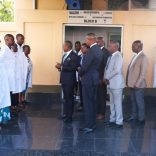Mozambique launches first forensic DNA laboratory - Watch
Hidden debts trial: 25 November 2021 – AIM report

Photo: Domingo
- Defendant “ruined my life”, witness accuses
Neuza de Matos, who had once been a legal adviser to former Mozambican President Armando Guebuza, on Thursday accused a man who had been her colleague, Renato Matusse, once a political adviser to Guebuza, of “ruining my life”.
Matos was giving evidence before the Maputo City Court, which is trying Matusse and 18 others for crimes linked to the financial scandal known as the “hidden debts”.
The term refers to the loans of over two billion US dollars which three fraudulent, security-linked companies. Proindicus, Ematum (Mozambique Tuna Company) and MAM (Mozambique asset Management) obtained from the banks Credit Suisse and VTB of Russia, on the basis of illicit loan guarantees issued by Guebuza’s government.
The Abu Dhabi based group Privinvest became the sole contractor for the three companies, and embarked on a massive bribery and money laundering scheme, in which Matos became caught up. In 2013, she sold her flat in central Maputo to Matusse for 450,000 US dollars, paid into accounts that she held in Maputo and in Lisbon.
She told the court that initially she believed the deal was above board and that the source of Matusse’s money was legitimate. He had told her it was money owed by his publisher in London for the books he had written.
She was surprised to find that, both in Mozambique and in Portugal, he had overpaid. 300,000 dollars had entered her account in Lisbon not once but twice, and in her Maputo account she received 300,000 rather than the 150,000 dollars she had been expecting.
Matos thought the overpayment was an honest mistake – until, in April 2017, she found that her name was on a list of people whose finances were under investigation by the Attorney-General’s Office (PGR), in connection with the hidden debts.
Matos then took a closer look at the bank documents concerning the sale of her house four years earlier. To her dismay, she found that the true source of the money was not any publishing company in London, but Privinvest.
She said she then went voluntarily to the PGR and handed over every document she possessed about the sale.
Matos, who by this time had left the Presidency and was working as director of the Prime Minister’s office, demanded an explanation from Matusse, but never received one.
Her supposed connection with the scandal had a serious effect on future job prospects and on her family. Matos said she tried to apply for a job in the private sector, but the chief executive officer of the company concerned told her “I couldn’t be considered, because my name was linked with the hidden debts”.
She said her son fell into a deep depression, and her mother was afraid that she would be arrested. “You used me for your own purposes. My name is dirtied because of you”, she told Matusse in an email message. “What have I done to deserve this?”
No apology was forthcoming, and no explanation. Indeed, in 2017 and 2018 Matusse often did not bother to reply to her messages.
Matusse’s lawyer, Salvador Kamati, demanded that the exchange of email messages be scrubbed from the court record, on the grounds that they had not been mentioned in the initial charge sheet. He even suggested that they might have been forged, in order to damage his client. But judge Efigenio Baptista could see nothing illegal in introducing the messages as evidence, and prosecutor Sheila Marrengula said the messages helped show what sort of a person Matusse is.
The money which reached her accounts, said Matos, came from Privinvest official Jean Boustani, and she had no idea how he had obtained her bank details. She denied Matusse’s claim that she had demanded part of the payment be deposited in Portugal. That was entirely Matusse’s idea, she said.
“My account number was given to Boustani, whom I don’t know. This was deliberate”, said Matusse. “Matusse did not act in good faith with me”.
Matusse himself testified on 10 September, when he denied receiving a bribe of two million dollars from Privinvest. Instead, he admitted that Boustani had purchased houses and other goods for him valued at over 1.66 million dollars.
He claimed that Boustani never paid him directly. He sent Boustani the bank account numbers of the owners of the houses and cars he wanted, and Boustani paid them. They then transferred the assets to Matusse.
That was how Matusse obtained the house where Matos and her family had once lived. Matusse told her he needed the house for his son – but when Matos revisited the house in 2017, she found it occupied by a man called Fanuel, and not by any member of the Matusse family.
Matusse is facing charges of money laundering, embezzlement and trafficking in influence.












Leave a Reply
Be the First to Comment!
You must be logged in to post a comment.
You must be logged in to post a comment.